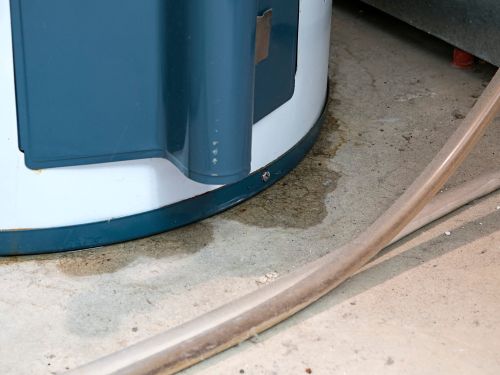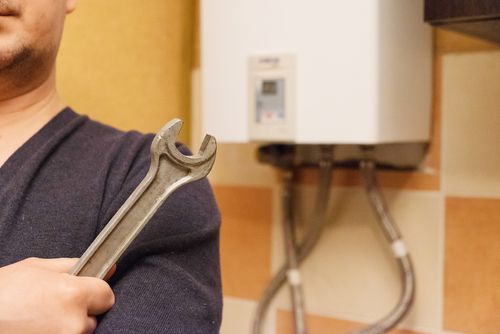What to Do if You Notice Your Water Heater Leaking
The water heater leaking is one of those potential problems many homeowners don’t think about often.
Since the water heater is often located somewhere in the home that people rarely frequent, many of us tend to fall into that “out of sight, out of mind” trap. We only become aware there’s a problem with the water heater when it becomes painfully obvious that something’s wrong.
At that point, it may already be too late to prevent serious damage from being done to your home.
We don’t want homeowners to constantly have issues with the water heaters they have. This article will shine a brighter light on that oft-used appliance and also discuss the things you can do to ensure that it doesn’t become a source of problems.

The Reasons Why Your Water Heater Is Leaking
Let’s first focus on why water heaters tend to leak. This probably won’t surprise you, but there are reasons why water heaters spring a leak.
Gradual Aging
Just like any other piece of equipment inside your home, water heaters are susceptible to the deteriorating effects of aging. Compared to many of the other appliances you use, though, these water heaters can be quite durable.
They can continuously function with no issue for up to ten years, and that’s true even if you barely do anything to maintain them.
Still, ten years can fly by in a hurry, and you may lose track of how old your heater is. Should this appliance start to malfunction, it may be worth your time to check out its receipt and see exactly when you purchased it. That may offer some insight into why it’s acting up.
The Hot and Cold Inlets and Outlets
Because of where they are on the water heater, the hot and cold inlets and outlets are more susceptible to damage compared to its other components. Check on these if you’ve noticed that your heater is starting to leak.
The Temperature and Pressure Relief Valve
There are several reasons why your water heater’s temperature and pressure relief valve could be causing the leak.
If the valve deals with too much pressure, it could start malfunctioning. The problem could also stem from the water heater raising the water’s temperature excessively. That can lead to damage to the temperature and pressure relief valve.
The Drain Valve
Since they designed the drain valve to get rid of any sediment that makes its way into the water heater, you should expect it to drip at least a little. However, there’s a significant difference between regular dripping and a full-blown leak. Make sure that the drain valve is not releasing any more than it should because that could grow into a real problem sooner rather than later.
The Water Tank
Consider it a big problem if the reason your water heater is leaking is because of the tank itself. You cannot resolve that quickly, and it may take a lot of money to address. The only real upside here is that you will know right away if there’s something wrong with the water tank because you’ll be seeing flooding instead of only leaking.
The Telltale Signs That Your Water Heater Is About to Leak
Unless your tank has a big hole in it, chances are you won’t notice there’s a leak right away. Inspecting your water heater now and then is a wise move, but the vast majority of homeowners don’t do that often enough.
The good news is that you don’t need to perform a thorough inspection of your water heater regularly to find out that it’s broken. You can keep an eye out for some of the symptoms of a broken water heater that we note below.
The Water Quality Has Changed
A lot of people prefer taking hot water showers in the morning. Some are capable of tolerating freezing cold water hitting their body that early, but others cannot handle it.
Now, you don’t necessarily need to worry about cold water raining down on you if your water heater is leaking, but you may notice that the water coming out is lukewarm instead of hot.
There’s a tendency to shrug off this anomaly and think of it as a byproduct of a colder than usual morning, but it could be an indicator that your water heater isn’t working correctly.
You can also get a hint of how well your heater is working by checking out if the water has rust particles in it. This is an issue you may have detected already because some of the clothes you’re washing suddenly have rust marks on them.
To check if there is rust in the water, you can pour some into a clear glass and see how the liquid looks. While you shouldn’t do it intentionally, you may also notice the rusty water while showering as some droplets get near your face due to the unusual smell and taste.
Rusty water is a sign that rust is starting to accumulate inside your water heater. It may not be leaking yet, but it could happen shortly.
The Exterior of the Water Heater Looks Rusty
Speaking of rust, you don’t need to detect it in the water to know that your heater could have problems sometime in the near future. You can also take a look at the exterior heater and see if rust has started to accumulate on it.
Rust showing up on the tank is a pretty good sign that there is a leak somewhere. Take the time to look at the burner units, too; they are similarly prone to rust.
The Water Heater Is Producing Noticeable Noise
Sediment piling up inside the water heater is inevitable. For a long time, that sediment will not make its presence known. Eventually, though, the sediment will harden and start to cause some noise whenever the water heater is in action.
If you’re trying to figure out if there’s something wrong with the heater, listening to it could work.
Puddles of Water Are Forming around the Water Heater
This is an obvious thing, but yes, if you’re starting to notice there are puddles of water forming around the heater, you should take that as a sign there’s a leak.
More often than not, the puddle of water indicating the leak will be directly under the heater.
How to Fix a Broken Water Heater
You now recognize the symptoms and can determine your water heater is leaking. So, what should you do next?
Here are some tips for how you should go about addressing the problem of your leaking water heater.
Detect Precisely Where the Leak Is
Even if you already know that the water heater is leaking, it’s important to remember that you cannot fix all leaks the same way. As we noted above, the leak could be due to faulty connections, valves, or even the tank itself.
Before you implement any repairs, focus first on detecting the leak.
See where the water accumulates, clean it up, then check again the following day to see if more water is there. That should tell you where a potential tank leak is.
As for the valves, nothing beats a close inspection to see if they are all sealed or causing water to drip out.
Turn Off the Power and Drain the Tank
Once you’ve determined that there is a leak and you’ve found where it is, go ahead and shut off your water heater.
You should shut electric water heaters down by using the circuit breaker box. Find the breaker that goes to your water and shut it off. You need to be thorough because you never want to be in a position where you could be standing in water while some electricity is still flowing through the wiring.
Gas heaters are easier to turn off because flicking the switch will do.
Once you’ve managed to completely shut down the water heater, you can proceed to drain the tank. Use either a hose or container to catch the water to keep your basement floor from turning into a riverbed.
Close Off the Water Supply
With the tank now empty, you can get to work on closing the water supply.
Look for the cold water shut off valve first. As long as you’re certain you can reach that valve safely, you can turn it off yourself. Doing that should be enough to prevent more water from pouring into the heater.
If the heater’s cold water shut off valve is located in a difficult spot, you can target your home’s main water valve instead.
Address the Problem Areas
It’s now time for the actual repairs, and they can range from being rather simple to remarkably complicated.
If the issue is related to cold and hot water inlets and outlets, you could resolve the problem yourself.
Check out the connections and see if there are any spots where they are loose. Bust out your wrench and tighten them. Doing that should be enough to get rid of your leaking issue.
Things won’t be quite as easy if the issues plaguing your water heater are related to the valves. There may be something off with the water pressure, but the issue could also be a broken valve.
In that case, you will need to replace the valve.
You could try to do that yourself, but if you lack the experience, you may end up making things worse. This is the point where you should strongly consider reaching out to the skilled and experienced professionals who handle these repairs all the time.
Lastly, if the tank itself already has a sizable hole in it, repairs may no longer work. You may need to invest in a replacement water heater at that point.

How to Maintain Your Water Heater
Regardless of whether you decided to repair your water heater or replace it completely, it’s in your best interest to maintain it better moving forward.
Thankfully, proper water heater maintenance is not a demanding task.
One thing you should always do is to keep an eye on the anode or sacrificial rod. This component of the water heater is responsible for gathering any debris inside the tank. Check on that semi-regularly to see if it still works properly.
You will probably need to replace it after two to three years.
Flushing the water tank of the heater is also something you should do if you want to prolong the life of this appliance. The process of flushing the tank is simple enough. Do it once per year to keep your water heater in good shape.
The Benefits of Maintaining Your Water Heater
Aside from prolonging the life of your water heater, maintenance is also important because it allows the appliance to work more efficiently. You’re getting more for your money if you take the time to maintain the appliance.
Taking the effort to maintain your water heater can save your home basement from damage.
The thing about the damages that stem from leakage is it isn’t always visible right away. By the time you start to notice, it may be too late, and you could find yourself on the hook for a hefty repair bill.
Invest your time in maintenance to avoid making that unnecessary payment.
Call the Professionals to Fix Your Water Heater Problems Properly
Fixing the water heater, yourself is worth trying, but if the repairs get a bit too technical, seeking some assistance may be necessary. Get in touch with the plumbing professionals at Best San Diego Leak Detection to have all your water heater problems addressed promptly and properly. You can also reach out if you have other plumbing-related issues you want them to address.
February 26, 2020 Categories: